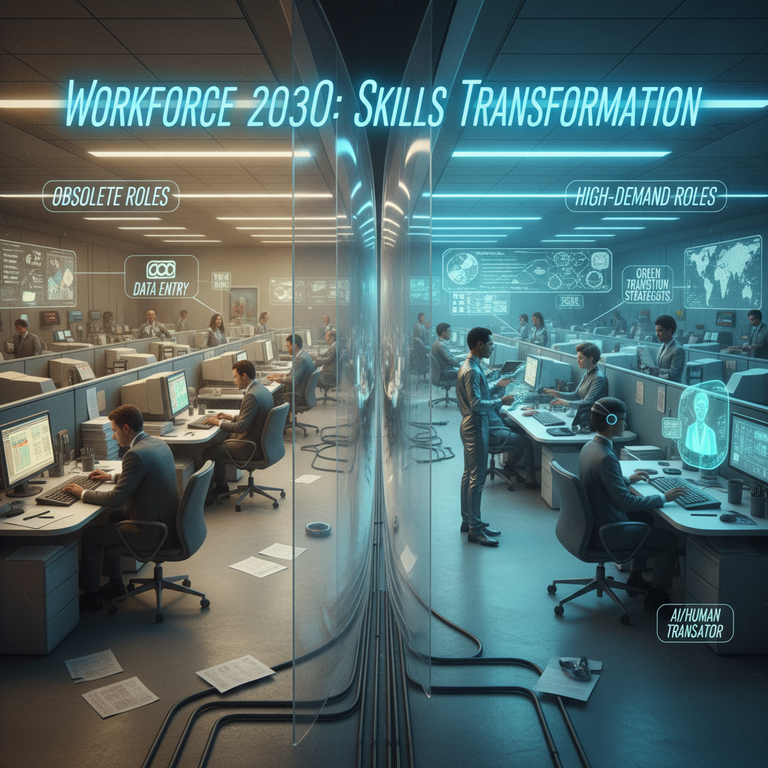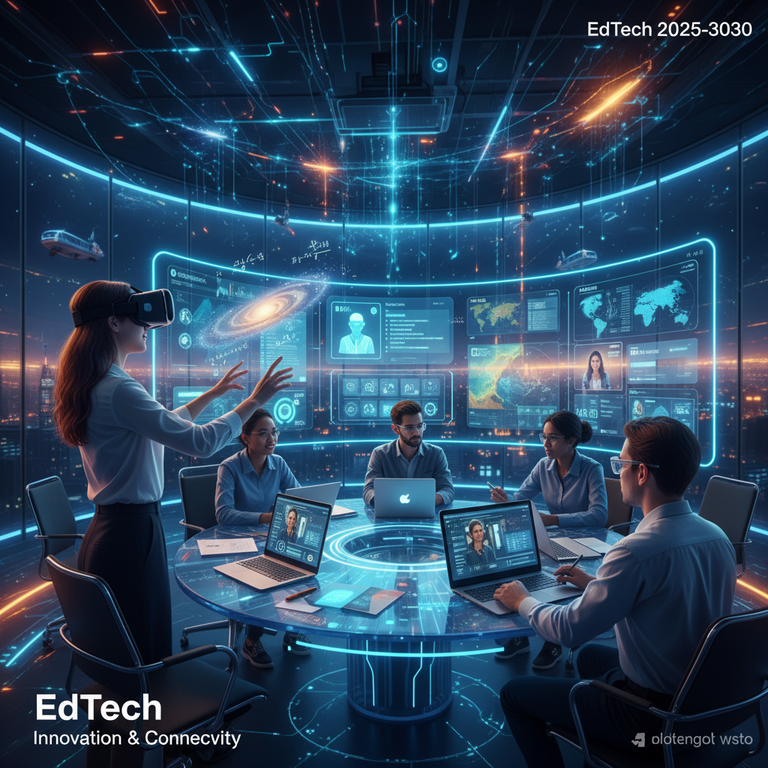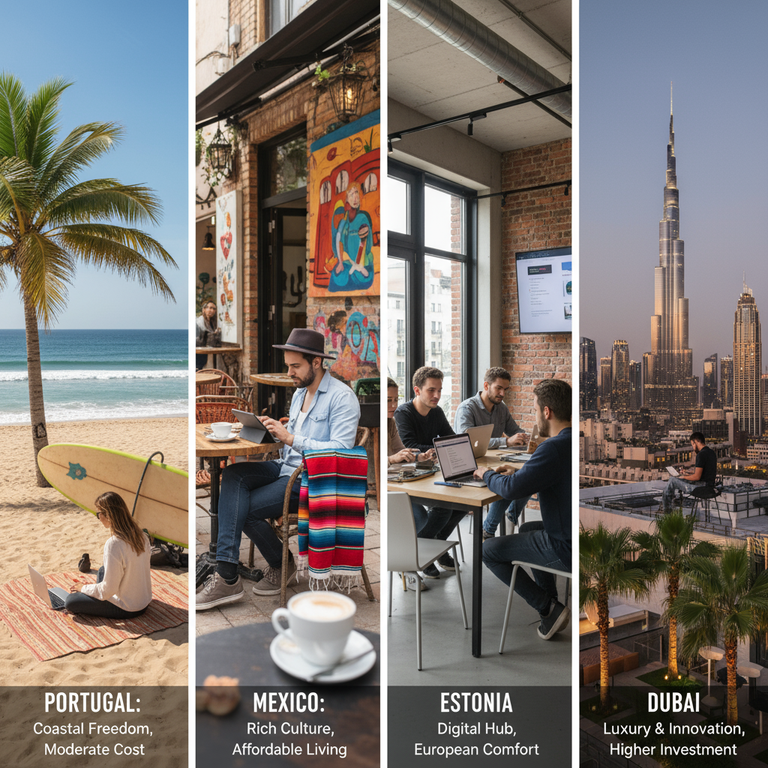The 2030 Skills Report: 5 Roles That Will Disappear (and 5 That Will Be High-Demand)
Advertisement
The conversation about the future of work is often filled with anxiety, dominated by the alarming pace of artificial intelligence and automation. It’s easy to fall into a narrative of obsolescence, worrying if your skills—or even your entire role—will exist in a decade. The pace of change is undeniable, and the “half-life” of a professional skill is shrinking faster than ever before.
But the story of work is not one of *replacement*; it’s one of *transformation*. While it’s true that technology will make certain tasks obsolete, it will also create a massive new demand for human skills that are, by their very nature, non-automatable. The professional who thrives in the next decade will not be the one who resists change, but the one who anticipates and adapts to it.
This is **The 2030 Skills Report**: an analysis of the tectonic shifts in the labor market. We will look soberly at the roles that will disappear (or, more accurately, diminish) and the new high-demand roles that will define the next era of professional value. The key takeaway is not fear, but a clear, strategic map of where to invest your learning and development.
The Great Shift: What Forces Are Shaping 2030?
Before we dive into specific roles, we must understand the forces at play. This isn’t just about AI. The future of work is being shaped by several massive trends colliding at once.
1. AI and Automation
This is the most obvious driver. AI is moving from a tool that *analyzes* to a tool that *creates* and *executes*. It is exceptionally good at routine cognitive and manual tasks: summarizing data, writing basic code, identifying patterns, and managing logistics. Any role defined by repeatable, predictable tasks is at high risk of being augmented or automated.
2. The Green Economy Transition
As the world moves toward sustainability, entire industries are being created while others are being phased out. This is creating a huge demand for roles in renewable energy, sustainability consulting, and green-tech engineering, while diminishing roles in traditional fossil fuel sectors.
3. The Care Economy
As populations in many developed nations age, the demand for healthcare, wellness, and elder care is exploding. These are roles that are fundamentally human-centric, requiring high levels of empathy, patience, and interpersonal connection—skills that are famously difficult (if not impossible) to automate.
5 Roles and Skills That Will Disappear (Or Diminish) by 2030
A “role” is often just a bundle of tasks. When we say roles that will disappear, we mean that the *tasks* that define them will be so heavily automated that the role itself will no longer be recognizable or necessary in its current form. Professionals in these fields will need to “level up” from *doing* the task to *managing* the system that does the task.
1. Data Entry and Basic Bookkeeping
Why: This is the prime example of a routine, cognitive task. AI and machine learning are already capable of capturing, categorizing, and processing invoices, receipts, and transactions with superhuman speed and accuracy. Software can perform reconciliations and generate basic financial reports instantly.
The 2030 Evolution: The bookkeeper becomes a “Financial Strategist” or “Data Auditor.” Their job is no longer to *enter* the data, but to *analyze* the AI-generated reports, spot anomalies, provide strategic advice, and manage the automated financial systems.
2. Routine Administrative and Secretarial Support
Why: Tasks like scheduling meetings, managing calendars, booking travel, and answering routine emails are being rapidly absorbed by AI-powered virtual assistants. These tools can now understand natural language, negotiate meeting times across multiple companies, and manage complex itineraries.
The 2030 Evolution: This role evolves into a “Chief of Staff” or “Executive Operations Partner.” They move from logistical support to strategic support, handling high-level project management, stakeholder communication, and business operations, while the AI handles the administrative “noise.”
3. Basic Graphic Design (Template-Based)
Why: AI-powered design tools can now generate thousands of high-quality logos, social media banners, and ad creatives from a simple text prompt. For businesses that just need “good enough” design based on established templates, automation is becoming the faster, cheaper option.
The 2030 Evolution: The “Designer” becomes a “Brand Strategist” or “Creative Director.” Their value is no longer in their Photoshop skills (the “how”), but in their *taste, strategy, and brand vision* (the “why”). They will *direct* AI tools to execute a high-level creative vision, not just create individual assets.
4. Telemarketing and Basic Customer Service (Scripted)
Why: Scripted, outbound telemarketing and first-level customer support (like password resets or order tracking) are already being handled by sophisticated chatbots and voice AI. These systems can handle thousands of concurrent interactions 24/7 without fatigue.
The 2030 Evolution: This role splits. The low end disappears. The high end evolves into a “Complex Problem Solver” or “Customer Success Specialist.” These are the human “super-agents” who handle the complex, emotional, and high-stakes escalations that the AI cannot solve.
5. Assembly Line and Warehouse Work (Repetitive Manual)
Why: Advanced robotics and computer vision have made automated “pick and place,” sorting, and assembly more efficient and reliable than human labor for repetitive physical tasks. Warehouses and factories are rapidly moving toward “lights-out” operations.
The 2030 Evolution: The “Line Worker” becomes a “Robotics Technician” or “Automation Supervisor.” Their job shifts from *doing* the physical labor to *maintaining, programming, and managing* the fleet of robots that do the labor.
The 2030 Skills Report: 5 High-Demand Roles and Skills
The future is not a barren wasteland; it’s a new ecosystem. The most valuable high-demand roles will be those that sit at the intersection of technology and humanity. These are the “un-automatable” skills.
1. The “AI/Human” Translators and Trainers
Why: As AI becomes the primary “workforce” for execution, we will need a new class of managers who can *talk to the AI*. These “AI Prompters,” “AI Trainers,” and “Machine Learning Curators” will be the bridge between human, strategic goals and the AI’s technical execution. They will be the ones who train, fine-tune, and creatively direct AI models to produce high-value results.
Required Skills: Critical thinking, creative prompting, linguistics, and a deep, intuitive understanding of how the AI “thinks.”
2. The “Green Transition” Strategists
Why: As stated in this 2030 Skills Report, every company, in every industry, is facing pressure to become more sustainable. This has created a massive need for “Sustainability Officers,” “ESG (Environmental, Social, Governance) Analysts,” and “Green Tech Engineers” who can navigate complex regulations and build new, profitable, sustainable business models.
Required Skills: Environmental science, data analysis, regulatory knowledge, and strategic business model innovation.
3. The “Care Economy” Empathy Providers
Why: You cannot automate empathy. As the population ages, the high-demand roles in healthcare, wellness, and mental health will soar. This includes nurses, physical therapists, mental health counselors, and senior care providers. These are jobs that require presence, compassion, and human touch.
Required Skills: Medical knowledge, patience, high emotional intelligence, and interpersonal communication.
4. The Cybersecurity and Digital Trust Experts
Why: As our world becomes 100% digital—run by AI, IoT devices, and cloud networks—our “attack surface” for bad actors expands exponentially. The need for “Cybersecurity Analysts” and “Digital Trust Officers” to protect our data, our finances, and our very infrastructure will be one of the highest-stakes battles of the next decade.
Required Skills: Network security, ethical hacking, risk analysis, and digital forensics.
5. The “Creators” and “Community Builders”
Why: As AI floods the world with “good enough” content, the premium on *authentic, human-led creative vision* will skyrocket. The “Creator Economy” is not a fad. The high-demand roles will be the “Brand Strategists,” “Creative Directors,” “Community Managers,” and “Storytellers” who can build a genuine, human-to-human connection, foster a tribe, and create a brand that people trust. This is the future of work for marketers.
Required Skills: Storytelling, brand strategy, empathy, creative direction, and a deep understanding of human psychology.
Conclusion: The Future Is Not About “Roles,” It’s About “Skills”
Stop worrying about your “job title.” Job titles are transient. The key insight from this 2030 Skills Report is that you must focus on building a *portfolio of skills* that are durable and transferable.
Notice the skills that appear in all the “high-demand” roles: strategic thinking, creative problem-solving, communication, emotional intelligence, and empathy. These are the human-centric skills that AI cannot replicate. Your career security in 2030 will not depend on your ability to *do* a specific task, but on your ability to *think, relate, and adapt* in a world where the “doing” is handled by machines. The future is a collaboration, and it belongs to those who learn to lead the machines, not compete with them.







